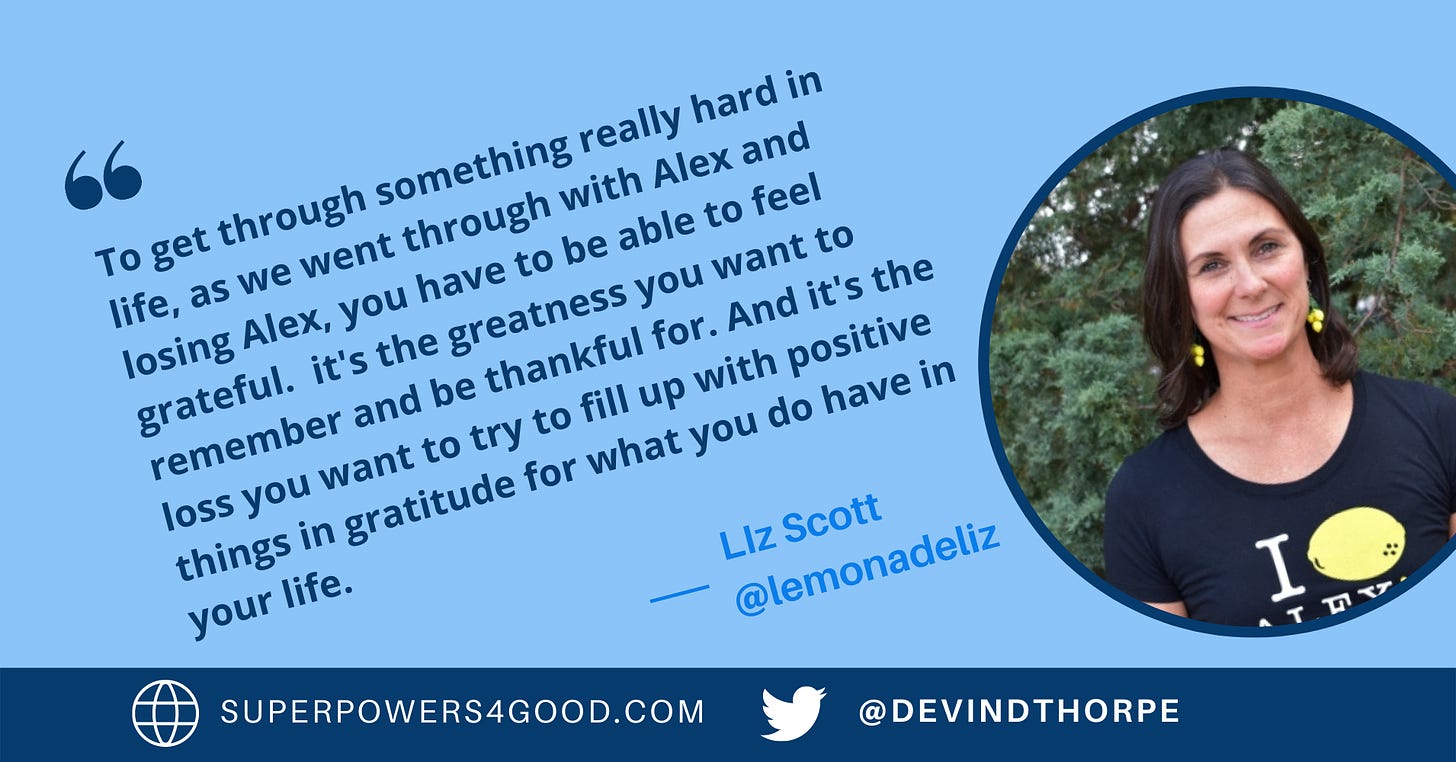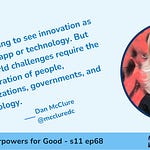This is an excerpt from Superpowers for Good and a replay of a podcast from 2017. Happy Thanksgiving!
Devin: Liz, what is your superpower?
Liz: I would say, if this counts as a superpower, probably gratitude. To get through something really hard in life, as we went through with Alex and losing Alex, you have to be able to feel grateful. You have to be able to feel grateful for what you have currently and to feel grateful for what you had. And with any loss, it's really important to feel as though the loss of the person doesn't take away from the greatness while they were here. Right? And it's the greatness you want to remember and be thankful for. And it's the loss you want to try to fill up with positive things in gratitude for what you do have in your life.
You can watch my interviews with Liz here: liz1.s4g.biz and liz2.s4g.biz.
Liz Scott is the mother of Alex Scott, the little girl who launched a lemonade stand to cure cancer. The lemonade stand became Alex’s Lemonade Stand Foundation and is now a player in a global race to end the insidious disease.
When I first interviewed Liz, I was an emotional wreck. While I’m a bit of a softy, and you can find me on occasion drying a tear during an interview, none were like this one. Taking what she told me and what I could learn from talking to others impacted by Liz and Alex, I prepared this retelling of the story.
Right now, my four-year-old cousin Simon is fighting for his life at Salt Lake’s Primary Children’s Hospital. Chances are, you know a child who is battling or has battled cancer.
I want to tell you a story that gives me hope for Simon.
Alex Scott was born a fighter. She arrived prematurely in 1996 and demonstrated her tenacity immediately, defying the odds and quickly earning the right to leave the hospital. Her mother, Liz, says it was a “glimpse” of what was to come.
Before her first birthday, Alex was diagnosed with neuroblastoma—Simon’s cancer.
Liz says, “Everything they had they threw at her.”
When she had a bad day, she would find a way to get through it with grace.
The doctors tried all the conventional therapies, chemo, radiation and surgery. Nothing worked.
So, they started experimental treatments. One, Metaiodobenzylguanidine or MIBG therapy, allowed them to perform a stem cell transplant.
Even before it was confirmed by the CAT scans, Alex told her parents the therapy was working.
Then, in January of 2000, she told her mom she wanted to do a lemonade stand. Given the weather in Connecticut at that time of year—not to mention that they were a little preoccupied caring for a cancer patient—her mom put her off.
In June, Alex, then four and half years old, said, “I still haven’t had my stand.”
Annoyed, her mother asked, “Alex, what do you want to buy so badly that you need to have this lemonade stand?”
“I'm not keeping the money; I'm giving it to my doctors so they can help kids the way they helped me.”
And so, Alex’s Lemonade Stand was born.
By the time she was six, she’d raised about $30,000. Her parents were giving the money exclusively to fund neuroblastoma research to find a cure for Alex’s cancer.
When Alex found out, she said, “That is so selfish.”
Her mom wanted to say, “I don’t care!”
Before she could get the words out, Alex said, “All kids want their cancer to go away. We should be giving money to all hospitals for all kinds of cancer.” That statement has defined the nonprofit's vision ever since.
Alex’s Lemonade Stand Foundation has now funded research on 25 different pediatric cancers.
Well, by age eight, Alex knew the treatments had stopped working. So, she was going to have one last stand and thought if everybody helped, if everybody had lemonade stands on the same day as hers, they could raise $1 million.
“She held on to see that goal met. She died knowing that she had accomplished this seemingly insurmountable [ambition].”
After Alex passed away, the Scotts weren’t sure they would continue the fundraising effort. Alex really was the driving force.
But other people kept supporting the cause.
“How could you walk away from the opportunity to help other children?” Liz said.
So, the work continues. As a result, real progress has been made, especially over the past ten years. She says she regularly hears from parents now who say their child has been in remission for one year, two years, three years. It is “indescribable” to think that Alex’s life has had that effect, Liz says.
Liz remains personally connected to the families of children with cancer even as the organization grows in scale and impact. “It’s both inspiring and really hard because a lot of them do really well. And some of them don’t.”
For the most common cancers, there are several treatment options. But, for families facing a rare cancer, there may be only one standard treatment—for some rare cancers, there are none.
It is for these families that Liz is most optimistic. She thinks curing cancer is realistic. Today’s progress is smart progress, she says. We’re looking at immunotherapies, targeted therapies and personalized medicine. That’s how every child will have the possibility of a cure.
Liz confesses, “When Alex said she was going to cure cancer with the lemonade stand, honestly, I thought it was cute, and I was proud. [But] I didn't think it would make a big difference in the world of fighting cancer.”
She couldn’t have been more wrong. Today, Alex would be 21. The tally of lives saved and extended by her Foundation is beginning to mount. By the time Alex would normally have reached middle age, a childhood cancer diagnosis may be no more threatening than a cold.
Alex lost her battle with cancer, but the organization she founded as a four-year-old selling lemonade in the front yard has gone on to raise over $150 million.
Alex won the war—for Simon.
Four years have passed since I wrote this, and the total raised is over $200 million.
And my Simon is cancer-free.
When you think about the money raised and the people who gave it, it is not so hard to understand Liz’s superpower: gratitude. But, on the other hand, when you think about the pain and suffering Alex endured without ever really having a chance to grow up, you begin to wonder how she could feel grateful.
Twice, more than two years apart, I asked Liz about her superpower, and she responded the same way each time. She is grateful. And it is her core strength.
How to Develop Gratitude As a Superpower
Liz’s story inspires me. I hope it inspires you, too. I am grateful for her willingness to share her story with me and you. I’m thankful that her work is saving children’s lives.
In our interviews, Liz explained the importance of gratitude in the face of tragic loss.
First, Liz suggests that gratitude can help you cope with loss. I would not have jumped to that conclusion, but she said, “To get through something really hard in life, as we went through with Alex and losing Alex, you have to be able to feel grateful. You have to be able to feel grateful for what you have currently and to feel grateful for what you had.”
Everyone has had significant losses. Feeling gratitude for what you had and lost strikes me as a profound life lesson.
Beyond coping with the loss, Liz suggests that gratitude motivates her to “fill up with positive things.” Raising $200 million to fight childhood cancer is a pretty positive thing.
The University of Minnesota provides a list of tips for increasing gratitude in your life.[1] Here are some highlights.
1. Say three things. Every day, say aloud three things you’re grateful happened that day—even if you’re alone.
2. Keep a journal. In it, focus on writing down the things you are grateful to have, to have had or to have experienced. On bad days, review your notes.
3. Thank your partner. Couples that express appreciation to one another are happier.
4. Stop when angry. Before reacting to a situation that has triggered your anger, think of five things you’re grateful for. It will cool your anger and allow you to approach the problem more constructively.
5. Thank yourself. You rock. You take care of yourself. Acknowledge yourself with gratitude for the good you do.
6. Text a thank-you. Once a day, think of someone to thank and send a quick text to express it. Just a moment will make a difference in your life and someone else’s, too.
7. Look for silver linings. Whenever something unfortunate happens, remember it could be worse. Then, look for the benefits that might come from the challenge—even if it is a simple reminder that what doesn’t kill you makes you stronger.
You can make gratitude a superpower. By following Liz’s example and these ideas, you can be more effective in your work and happier in your life.
[1] Andrea Uptmor, University of Minnesota, Earl E. Bakken Center for Spirituality and Healing, “10 Ways to Be a More Thankful Person,”























A Mother's Gratitude Following Tragedy Saves Countless Lives